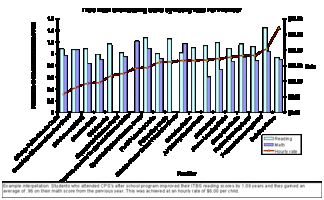Chicago Compares Tutors But Seems to Slow Rollout of Tutoring in Year 3

Earlier this week, the Chicago became one of the first cities in the country to publish a comparative review of tutoring providers and their impact (or lack thereof) on student achievement.
However, the immediate question remains whether more, or less, tutoring will be provided in Chicago this fall, the third year of tutoring -- with the district no longer allowed to provide its low-cost (but large-group) tutoring and little evidence of the enrollment effort that was the hallmark of the program last year.
Initially, local coverage suggested that the tutoring was working: Tutoring study shows promise in key group (Tribune), Tutoring boosts reading scores (Sun Times). Indeed, students who received tutoring made more progress last year than the year before, and slighly more progress than other eligible students who didn't participate and much more progress than they had the year before.
However, a follow-up Tribune editorial (Has tutoring worked?) suggested that the report -- showing effects sizes compared to similar students that can be measured in days and weeks rather than months -- "doesn't provide much encouragement that taxpayers got their money's worth last year."
My take on the study is that its main value is not proving one way or the other whether tutoring works -- or whether CPS should continue to be a tutoring provider as it was and wants to be. Instead, the study shows that:
- most of the kids getting tutoring are the ones who need it -- 75 percent of them are below average on reading and math
- the tutoring is overhwhelmingly popular with families
- CPS-provided tutoring is cheaper, yes, but not much better than any of the big providers
- some of the companies that seem to be making the most difference are online or mixed onsite/online (like Progressive)
- Platform, the company kicked out of several schools last year by CPS, doesn't seem to fare that much worse than anyone else
To be sure, the report will become part of the ongoing debate over private, for profit tutoring companies. In Chicago, the immediate question is whether CPS will be as enthusiastic about enrolling kids in tutoring as it was last year, when it was still providing tutoring to almost half the kids.
So far, the district seems like it's getting a slow start, and has suffered a couple of setbacks. They weren't able to screen some providers out as they had hoped, leaving that up to the state next year, and they weren't able to get big discounts from providers for using school space, which would have reduced the cost of the tutoring and theoretically increased the number of kids who could be served.
Just a couple of weeks before school, there's no news that principals have signed up for a handful of providers as they did last year, or given parents time and information to choose which ones they want.
The combined effects of district intertia/ambivalence and the absence of the low-cost CPS program could result in fewer kids getting tutored this year than last year, which would be a shame and a bit of an embarassment.

The study itself is not yet online.Email me if you want a copy.

1 Comments:
What the study really shows is that someone, whether the district or someone else, should be doing these types of studies (or improved ones). However it begs the question as to whether these results are worth $50 million or so. Take a moment and think about that number. It's 3 times more than the district spends on its regular school day mathematics program for ALL students in the district. From a policy perspective is anyone asking--is this really the best use of these dollars? For the same amount of money we could provide math, reading, and science supplies for 80-90% of ALL elementary students districtwide. No one, at any level, as far as I'm aware has gone out on a limb and made an argument about HOW MUCH students should benefit from tutoring and what price. Should we expect students to make a year's gain, just catch up to their peers, something else? Should we get these results for $1 mil, $10 mil, or $100 million?
Post a Comment
<< Home